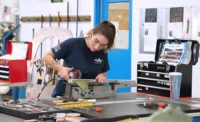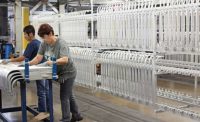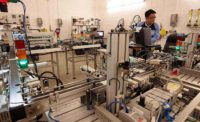Training the next generation of manufacturing workers is essential to the success of U.S. manufacturing and the economy. A recent McKinsey study found that restoring growth and competitiveness in 16 key manufacturing industries could boost annual U.S. GDP by more than 15 percent. A talent pool of qualified job candidates is essential for meeting U.S. manufacturers’ needs for capacity, productivity and innovation. Developing a skilled workforce will help us to overcome our lack of global cost competitiveness and drive long-term reshoring and growth.
Seventy-seven percent of manufacturers say they will have ongoing difficulties in attracting and retaining workers in the next few years. A Deloitte study finds that, “Left unabated, the manufacturing skills gap—which is now anticipated to leave 2.1 million jobs unfilled by 2030—could cost the U.S. economy as much as $1 trillion.”
For example, semiconductors are considered the backbone of the technology industry and critical to U.S. economic growth, national security and global competitiveness. The United States was once the global leader in semiconductor manufacturing, but over the past 30 years, our share of global chip production has fallen from 37 percent to just 12 percent. Unfortunately, growth in the U.S. semiconductor industrial base is threatened by a talent gap. According to a study conducted by Deloitte and Semiconductor Equipment and Materials International, 77 percent of industry executives believe there is currently a critical talent shortage; 82 percent believe there is a shortage of qualified candidates; and 73 percent see a lack of diverse skills and talent.
The skills gap could cost the U.S. economy as much as $1 trillion.
Collaboration for Workforce Development
Here are some partnerships, companies, communities and training initiatives that are trying to close the manufacturing skills gap, correct misperceptions, and up-skill and re-skill the U.S. manufacturing workforce.
A semiconductor workforce development program is part of Intel Corp.’s $20 billion commitment to build two new chip factories in Ohio. The tech giant is investing $100 million over the next decade to support education, research and workforce development in the U.S. Approximately $50 million will establish an Ohio semiconductor education and research program, providing new certifications, faculty training and programs to re-skill and up-skill the existing workforce. The remaining $50 million will be matched by an additional $50 million from the U.S. National Science Foundation for grant funding over the next decade.
Volvo recently opened a “Car University” and technical center at its South Carolina assembly plant. The facilities will provide industry-leading training, including a leadership program created in partnership with the Yale University School of Management.
Tool giant Stanley Black & Decker is changing the manufacturing misperception narrative with a $25 million initiative to advance vocational skills training programs over the next five years. The training programs are designed to change misperceptions that skilled trade careers are not well-paying. The company has been a leading example of reshoring, including bringing back production of the Craftsman line.
France-based Schneider Electric, a manufacturer of energy management and automation equipment, has chosen El Paso, TX for a new assembly plant to boost domestic manufacturing capacity. “The supply chain challenges of the past year have demonstrated the importance of increasing our domestic manufacturing capacity as quickly as possible,” says Annette Clayton, CEO and president of Schneider Electric North America. Schneider Electric’s investments of more than $100 million in 2021 and 2020 have been used to build and equip new plants, purchase new equipment and tooling, and hire, train and upskill its workforce.
The National Tooling & Machining Association (NTMA) is a trade association committed to ensuring the future of manufacturing. NTMA is working to help fill the manufacturing skills gap through a suite of programs targeted at students and their families, schools, the current workforce and support organizations.
The Society of Manufacturing Engineers (SME) is a nonprofit association of professionals, educators and students committed to promoting and supporting the manufacturing industry. Through Tooling U-SME, webinars, the SME Education Foundation, the SME PRIME schools initiative and other programs, SME creates opportunities to help advance today’s workforce and develop the next generation of manufacturing professionals.
In Part 2 of this series I will discuss the role of government in strengthening the workforce.
About the Author
Harry Moser is the president of the Reshoring Initiative. His column will appear every other month, alternating with Austin Weber’s “On Campus.” Has your company reshored production? Are you thinking about it? We’d like to hear of your success or help you achieve it. With your approval, we would love to report on your successes or opportunities in future issues. Contact harry.moser@reshorenow.org.




